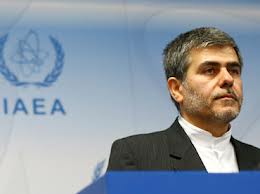UPDATE 1510 GMT: Many Western outlets have picked up on an extract from an interview of Abbasi Davani by Al Hayat in which the head of the Atomic Energy Organization that Iran intentionally passed misleading information to the International Atomic Energy Agency.
That declaration inevitably has led to assertions of Iran's deceit over its nuclear programme. However, it needs to be considered in conjunction with Abbasi Davani's asssertion that the IAEA has been penetrated by operatives of foreign intelligence services or has passed data to those agencies. In other words, the Iranian "deception" is a necessary defence to prevent espionage via the IAEA.
 Fereydoun Abbasi DavaniThe Iranian carrot-and-stick show over nuclear negotiations continues. Tehran pressed for the resumption of high-level talks on Monday and Tuesday, both through the visit of lead negotiator Saeed Jalili --- where he met his counterparts for the 5+1 Powers, Catherine Ashton, and the "broker" for diplomatic steps, Turkish Foreign Minister Ahmet Davutoğlu --- and through a signal welcoming further discussions with the International Atomic Energy Agency.
Fereydoun Abbasi DavaniThe Iranian carrot-and-stick show over nuclear negotiations continues. Tehran pressed for the resumption of high-level talks on Monday and Tuesday, both through the visit of lead negotiator Saeed Jalili --- where he met his counterparts for the 5+1 Powers, Catherine Ashton, and the "broker" for diplomatic steps, Turkish Foreign Minister Ahmet Davutoğlu --- and through a signal welcoming further discussions with the International Atomic Energy Agency.
On Wednesday, the head of the Iranian Atomic Energy Organization, Fereydoun Abbasi Davani, showed the stick. In an interview with Press TV, Abbasi Davani --- who had offered his own "carrot" with a declaration on Sunday that Iran did not see enrichment of uranium beyond 20%, and thus for military use --- pointedly criticised the IAEA and its head, Yukiya Amano:
Normally the reports are never circulated; especially, those which are provided to the Board of Governors and General Conference. But we have realized that even prior to the reports of IAEA chief Mr. Amano to the General Conference, some institutes gain access to the information.
If Mr. Amano ignores our request for not disclosing our data, he will be held accountable for possible damage inflicted on Iran's facilities, be it by a terrorist act or a military operation....
He [Amano] should be more responsible in this regard, particularly in a situation where some countries are hostile to Iran.
Abbasi Davani's allegation has more than a shred of substance: the IAEA's "confidential" reports always appear soon after their circulation, often on the website of the International Institute for Strategic Studies. But of course, the Iranian official has a political motive as well, trying to show a position of strength and to get some distance between the IAEA and the US-European bloc facing Tehran.
That approach has been over-interpreted by some leading analysts. For example, they assessed a weekend warning by Abbasi Davani --- ignoring the "carrot" over 20% uranium --- as the prospect that Iran would leave the Nuclear Non-Proliferation Treaty.
It will not, at least not at least not in the foreseeable future. However, the Islamic Republic is also signalling that it will not concede to the US-European demand --- restated diplomatically by Catherine Ashton's office after her Tuesday meeting with Jalili --- that it offer a notable concession before high-level talks resume. And that in turn means that the political stalemate, the sanctions hampering Iran's economy, and Tehran's carrot-and-stick rhetoric will continue.